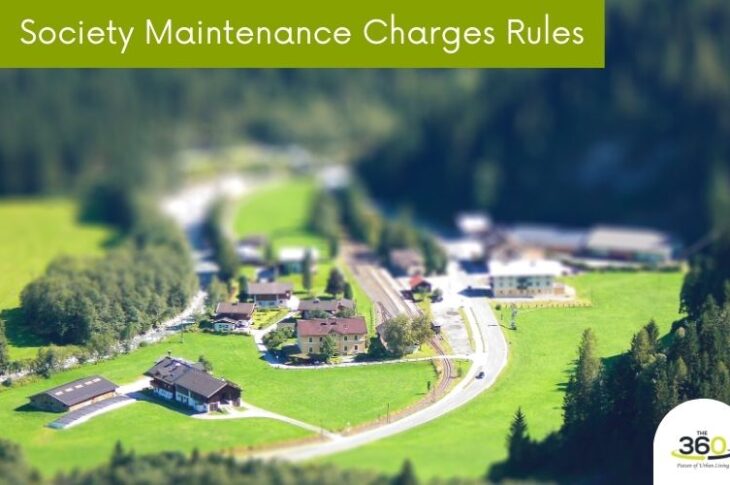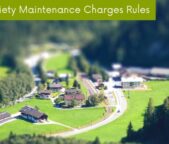Housing Society
Must know facts for society maintenance charges rules
- 6 months ago
|
- 0 comments
Buying a property is a dream for many and when it is in a white-picket fence community the achievements come with being a part of a more diverse and inclusive society. Therefore, owning an apartment in a gated community also means shared responsibilities to some extent. Society maintenance charges are one of the regular costs that occur to permanent or tenant residents.
What is society’s maintenance charge?
Society maintenance charges which the residents pay to the association to upkeep the common areas of the community. This is the operational charge which is levied on the permanent resident or owner of a particular unit. It is an essential expense or can be considered as one of the investments for convenient living. Every amenity, common area, or service you require in your housing complex is included in the society maintenance charges. These ready-to-move-in apartments are encircled with top-notch safety, security, and convenience. Resident Welfare Association (RWA) or Society Management Committee is responsible to lead the process by setting housing society maintenance charges rules and regulations adhering to the government guidelines.
Types of Society maintenance charges
Based on the nature of shared areas and common facilities society maintenance charges are levied. It also varies depending on the status of the unit. If the unit is not occupied by the owner and it is vacant or leased to tenants then the charges are calculated accordingly. As per the guidelines provided by the bye-laws, the charges can be categorized in:
Parking charges
Residents who own vehicles are charged a particular amount for the parking place they book. The rate for society maintenance bill depends on the type of vehicle like two-wheeler or four-wheeler.
Service charges
Any maintenance required for the common areas and the occurred expense for it is included here. Also, to take care of the property materials the charges are divided among the residents equally with a minimum rate of 0.75% per annum.
Water charges
As a mandatory charge, the amount charged from every resident can be fixed or fluctuate. Generally, it is set depending on the number of inlets provided for the exact unit.
Non-occupancy charges
In the case of your vacant place or unit, the owner must provide a non-occupancy charge which can not be more than 10% of the service charge.
Sinking fund
The RWA always possesses an amount for unforeseeable situations and risk management. This is charged 0.25% of the construction charge for each flat.
Insurance charges
This charge is not compulsory only if the association has insured for any common property then the amount is added to the society maintenance bill.
Lease or Rent charges
Society maintenance charges for it are levied based on the built-up area of the flat or unit.
Other charges
This section is variable as decided by the society management team.
RERA guidelines
In general, the maintenance charges are levied based on the carpet area of the unit. The extra amounts are determined based on the services the residents are availing. Although, the government has fixed some rules under RERA, Real Estate Regulatory Authority keeps it transparent and reasonable.
RERA rules for the society maintenance charges:
Under the RERA guidelines, the maintenance charges can be collected based on two specific ways.
The owner or the buyer of the property has to pay an amount for the building maintenance.
For a certain time, the builder of the property maintains the entire project. The builder can demand the charges from the owners of the properties.
Some other RERA rules that must be adhered as follows:
Until any property is handed over to the RWA till then the builder must provide for the maintenance of it. The builder can get back the amount from the property buyers under the society maintenance charges act under section (4) (d).
The builder must clear out the charges in the allotment letter. The letter can be sent after the buyer pays for the booking amount.
The buyers do not have to pay any kind of ad-hoc charges as mentioned in the RERA Act 2016.
Non-disclosure of any kind of charge can create confusion among buyers.
The state government can set the highest amount of the society’s maintenance charges.
The builders or associations can not demand any extra amount except the ones mentioned in the letter.
The charge can variable from resident to resident as it is calculated based on the carpet area of the flat.
The collection frequency must be determined by the association or the builder.
The GST charge of @18% can be levied if the maintenance costs more than 7500 from the residents.
How are maintenance charges calculated?
As discussed before the maintenance charges can differ for each resident. Keeping in mind every resident’s grievance and discomfort the calculation of society maintenance can be different and they can use different calculation systems.
1. Per square feet based calculation method
This system is only used when the apartments are of different sizes and carpet areas are not specific.
2. Equal fee
The charges are pre-determined and not variable every month in this method. This is only used when the size of the apartments is exactly the same or can be approximately different.
3. Hybrid fee
This method is created by combining the mentioned two methods. For a fair process, the square feet-based charges are for clubbed components such as repair or sinking funds. Whereas, equal fee is levied on other categories for a few common areas like lift and service fees.
Why digitalized platform is more preferable?
Seems quite confusing, right? Well, it can be with so many rules, regulations, and calculations. The only solution would be to provide strong technical support and expert assistance. Therefore, switch to automation and be more efficient and productive. Shift to a fully digitalized process for society maintenance charges calculation. Software that can cut costs also makes it a time-saving process. Also, a GST complaint tool can help it more for keeping the process fully automated.
Conclusion
The ultimate solution would be to follow a proper method and be more transparent. When the fund is built on public contribution it must follow the exact guidelines of government. For any inconvenience caused, the owners can approach RERA as per their state and get any information out of the builder. RERA takes necessary actions for any complaint.

